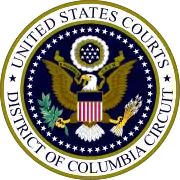United States v. Moore
United States v. Moore, 486 F.2d 1139 (D.C. Cir. 1973),[1] was a case decided by the D.C. Circuit that refused to recognize a common law affirmative defense of addiction in a criminal prosecution for the possession of heroin.[2]
| United States v. Moore | |
|---|---|
 | |
| Court | United States Court of Appeals for the District of Columbia Circuit |
| Full case name | United States of America v. Raymond Moore |
| Argued | September 10, 1971 |
| Decided | May 14, 1973 |
| Citation(s) | 486 F.2d 1139 |
| Case history | |
| Subsequent action(s) | Certiorari denied, 94 S. Ct. 298 (1973). |
| Court membership | |
| Judge(s) sitting | David L. Bazelon, J. Skelly Wright, Carl E. McGowan, Edward Allen Tamm, Harold Leventhal, Spottswood William Robinson III, George MacKinnon, Roger Robb, Malcolm Richard Wilkey (en banc) |
| Case opinions | |
| Per curiam | |
| Concurrence | Wilkey, joined by MacKinnon, Robb |
| Concurrence | Leventhal, joined by McGowan |
| Concurrence | MacKinnon |
| Concurrence | Robb |
| Dissent | Wright, joined by Bazelon, Tamm, Robinson |
Decision
The defendant Moore was charged with the possession of heroin, and in his defense sought to introduce psychiatric testimony that because of his heroin addiction he lacked substantial capacity to conform his behavior to the standards of the criminal law. The court refused to recognize Moore's proposed common law defense of addiction because of difficulties in administration and inconsistency with the Model Penal Code.[3]
A dissenting opinion by Judge J. Skelly Wright advocated for the recognition of the common law defense.[4]
References
- United States v. Moore, 486 F.2d 1139 (D.C. Cir. 1973).
- Bonnie, R.J. et al. Criminal Law, Second Edition. Foundation Press, New York: 2004, p. 587
- Bonnie, p. 590
- Bonnie, p. 587